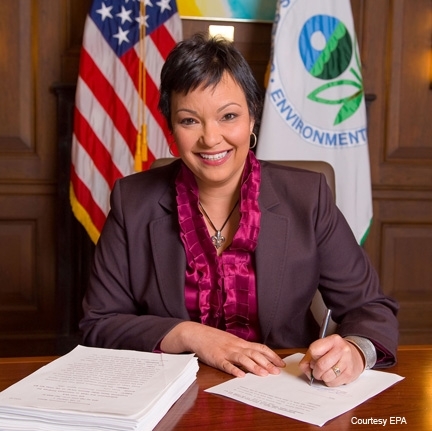The U.S. Environmental Protection Agency has proposed carbon dioxide restrictions that will effectively ban the construction of coal-fired power plants.
The proposed restrictions would block the construction of any new power plant that does not limit its carbon dioxide emissions to 1,000 pounds per megawatt-hour. The proposed restrictions would effectively end the construction of coal-fired power plants, which emit approximately 1,800 pounds per megawatt-hour.
Asserted Threat to Health, Welfare
In 2007 the U.S. Supreme Court ruled carbon dioxide qualifies as a pollutant under the Clean Air Act and EPA must regulate it if it determines carbon dioxide poses a threat to human health or welfare.
“Consistent with the U.S. Supreme Court’s decision, in 2009, EPA determined that greenhouse gas pollution threatens Americans’ health and welfare by leading to long lasting changes in our climate that can have a range of negative effects on human health and the environment,” said an EPA March 27 press statement announcing its proposed restrictions on newly constructed coal-fired power plants.
“Today we’re taking a common-sense step to reduce pollution in our air, protect the planet for our children, and move us into a new era of American energy,” said EPA Administrator Lisa P. Jackson in a separate press statement. “Right now there are no limits to the amount of carbon pollution that future power plants will be able to put into our skies—and the health and economic threats of a changing climate continue to grow.”
But Cold, Not Heat, Kills
Emergency medical physician John Dale Dunn, a policy advisor for the American Council on Science and Health, disputed EPA’s assertions about carbon dioxide harming human health and welfare.
“EPA has no objective data to back up its health-and-welfare claims,” said Dunn. “Mortality statistics show that 800 more people die each day in the United States in December, January, and February than in the other months of the year.”
“EPA’s assertions are based on junk science,” Dunn explained. “Cold weather brings an increase in heart attacks, strokes, respiratory problems, and susceptibility to viruses. Global warming theory holds that most of the projected human-caused warming will occur in the cold-weather months, which is ideal for reducing climate-caused mortality.”
“If warmer temperatures threaten human health, then why is human mortality in the United States lowest during the summer and highest during the winter?” Dunn asked. “The clear impact of temperatures continuing their recovery from the cold depths of the Little Ice Age is to improve rather than harm human health and welfare.”
Union President Fears for Jobs
United Mine Workers President Cecil Roberts strongly contested EPA’s assertion its restrictions would benefit the economy. Roberts told listeners in an interview on the West Virginia MetroNews Talkline radio program, EPA’s new restrictions would kill jobs merely to please environmental activists.
“This is a broader problem for me than it is for the Sierra Club or the EPA,” Roberts told program host Hoppy Kercheval. “And I’m convinced, Hoppy, that if you give the Sierra Club enough money, they could shut your job down. I don’t know how they’d do it, but they’d figure out a way.
“I noticed this past week the vice president was talking about the campaign and he mentioned that Osama Bin Laden was dead and General Motors was alive. He should have gone on to say that the coal industry is not far behind with respect to what happened with Osama Bin Laden,” Roberts added.
Roberts said he doesn’t expect the United Mine Workers to actively oppose President Obama in the November elections as a result of the EPA restrictions, but EPA’s decision may persuade the union to refrain from giving Obama their expected endorsement.
“That’s something that we have not done yet and may not do because of this very reason. Our people’s jobs are on the line,” Roberts explained.
Skyrocketing Electricity Prices
Energy analyst Daniel Simmons, director of regulatory and state affairs at the Institute for Energy Research, was equally critical of EPA’s economic claims.
“The real economic threats related to global warming are coming from EPA’s proposed ‘solutions,’ not a modestly changing climate,” Simmons said. “Warming temperatures have improved soil moisture, lengthened growing seasons, expanded forests, shrunk deserts, and benefited human health and welfare in just about every way possible. EPA’s proposal for restricting coal and substantially raising energy prices, by contrast, will harm human health and welfare.”
Simmons added, “Coal-fired electricity generation is some of the cheapest electricity generation in the United States. Of the 15 states with the cheapest electricity, coal produces the largest share of electricity in nine of them. But EPA’s regulation is threatening affordable electricity prices by essentially banning the building of new coal-fired power plants.
“President Obama said in 2008 that he would eliminate coal-fired power plants and electricity prices would necessarily skyrocket. Rapidly rising electricity prices are a goal of EPA and the Obama administration, and these proposed restrictions on power plant emissions will ensure the administration achieves its goal of skyrocketing electricity prices,” he explained.
Natural Gas Targeted Next?
Natural gas is the only widely available electricity source that is cost-competitive with coal. Natural gas power plants emit approximately 800 pounds of carbon dioxide per megawatt-hour and therefore barely escape EPA’s proposed restrictions. Simmons says EPA may take future action to make the restrictions more stringent. Environmental activist groups are in fact pressuring EPA to impose new restrictions on natural gas production that would substantially increase costs or ban the extraction of natural gas from lucrative shale formations.
EPA will accept public comments for 60 days following publication of its proposed carbon dioxide restrictions in the Federal Register.
James M. Taylor ([email protected]) is managing editor for Environment & Climate News.





